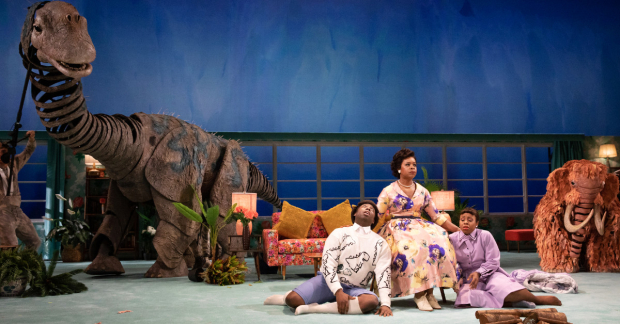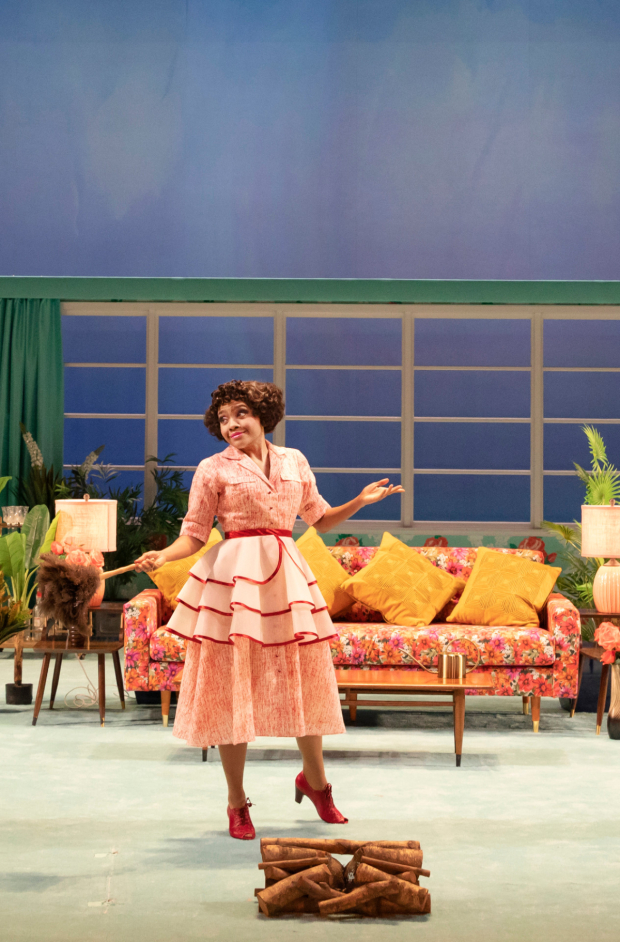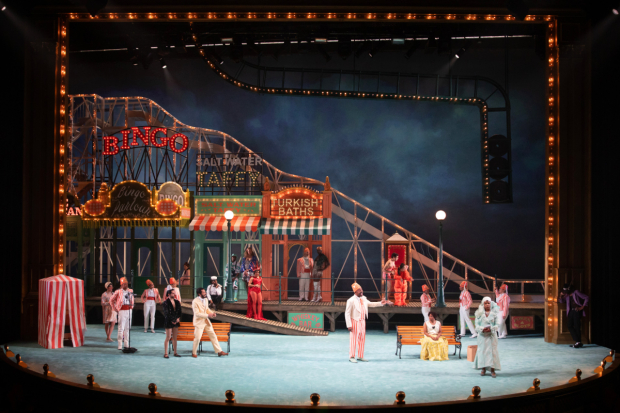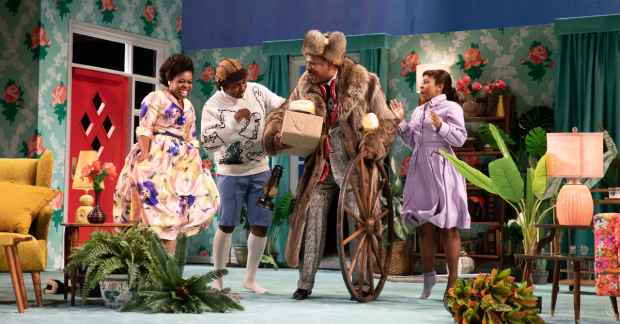Review: A New Jersey Family Survives an Ice Age and More in The Skin of Our Teeth

(© Julieta Cervantes)
"Seven of our actors have … have been taken ill," says Mr. Antrobus near the top of the third act in Thornton Wilder's The Skin of Our Teeth, and for a moment we believe the news. After all, it wouldn't be the first time in recent memory that Broadway audiences have heard something similar.
But after two hours of experiencing the other metatheatrical, fourth-wall-breaking antics that Wilder baked into his Pulitzer Prize-winning play (which premiered on Broadway in 1942), we realize the gag. "Apparently, it was something they ate," continues Mr. Antrobus, or rather the fictitious actor playing Mr. Antrobus (played by James Vincent Meredith). The actors are fine, and the show will go on.
The show does go on — and so does life, despite coronaviruses, wars, and natural disasters: That's the main theme of Wilder's epic theatricalized comic strip of human history, and Lileana Blain-Cruz (making her directorial Broadway debut) has captured that timely theme in one of the most eye-popping, visually captivating productions you'll see this season. Featuring a news-reel-playing movie screen that looks big enough for an IMAX theater (stunning projections by Hannah Wasileski), an enormous Atlantic City boardwalk scene with a slide that descends dizzyingly from the flies (extraordinary set design by Adam Rigg), and impressive woolly mammoth and talking dinosaur puppets, The Skin of Our Teeth is a wild ride, even if it is a bumpy one at times.

(© Julieta Cervantes)
Part of that bumpiness has to do with the unevenness of the play itself. The three-hour, three-act saga follows an Everyfamily called the Antrobuses, a middle-class household of four, plus a maid, who live through millennia of human history in the fictional town of Excelsior, New Jersey, and survive one disaster and cataclysmic event after another — an ice age, a great flood, and a devastating war.
The first act, in which a glacier quickly approaches the Antrobuses' 1950s-styled home and threatens them with extinction, is a comic tour de force. Making her Broadway debut, the magnificent Gabby Beans, who plays the maid Sabina, is the source of much of this act's hilarity as she darts about the stage and delivers her lines a mile a minute like a madcap Eartha Kitt on roller skates.
A marvelously poised Roslyn Ruff plays the family's matriarch, whose primary job is to keep her two children in line. There's the favorite, Gladys (a radiant Paige Gilbert), and the rowdy, stone-throwing, at times murderous Henry, a.k.a. Cain (Julian Robertson in a funny and intense performance). As if they weren't enough, Mrs. Antrobus has to prevent the furniture from being trampled by the family dinosaur and mammoth (puppeteers Jeremy Gallardo, Beau Thom, Alphonso Walker Jr., and Sarin Monae West bring these fantastic contraptions to life), while her husband is at the office inventing the alphabet and the wheel.

(© Julieta Cervantes)
The nonchalant blending of the present with historical and biblical figures and events took some audience members at the performance I attended off guard, with bemused harrumphs erupting here and there. Many will know Wilder from his play Our Town, a staple of high school classrooms, and Hello, Dolly!, the beloved musical adaption of his play The Matchmaker. Out of the triad of his major plays, The Skin of Our Teeth is his most experimental (he admitted the play's indebtedness to another highly experimental work, James Joyce's Finnegans Wake), and is perhaps his least known. Blain-Cruz may help change that. In any case, this production at the Vivian Beaumont Theatre will set the standard for The Skin of Our Teeth for some time to come.
To her credit, Blain-Cruz has undertaken the gargantuan task of giving the play the grand treatment it deserves. That's not to say that the production doesn't have some dull, slow-moving parts. The second act takes the action to the Atlantic City boardwalk where the cast performs a splashy choreographed number while decked in Montana Levi Blanco's colorful costumes. The scene orbits around Mr. Antrobus's speech at a convention of the Order of Mammals (Subdivision Humans), and Priscilla Lopez's prognostications as the Fortune Teller, who makes disarming predictions for every passer-by and gives a sobering monologue about the nature of regret. Despite the festive atmosphere, thunder booms in the distance (Palmer Hefferan's sound design rumbles throughout the theater) and presages an approaching flood as we feel the fun of the first act slowly begin to evaporate.
By the third act, which depicts a world devastated by war, the play's humor all but vanishes, striking us with familiarity as our minds inevitably turn to the horrors occurring in Ukraine. Yi Zhao's lighting bathes the stage in a ghostly glow as Mr. Antrobus returns from the battlefront and confronts Henry, now a vicious warmonger who appears determined to defeat all his enemies, real and imagined. Take your pick from our modern-day autocrats and hatemongers — Henry is the analogue for all of them past and present. As the play becomes darker, it becomes a more difficult watch, and we end up longing for the playful energy of the beginning.

(© Julieta Cervantes)
Yet The Skin of Our Teeth retains an urgency worth paying attention to. A couple of changes have been made from Wilder's 80-year-old script: Branden Jacobs-Jenkins has made modest additions to the text (works of bell hooks and Maya Angelou receive mention) to offset the play's relevant but musty quotes from the likes of Aristotle and Spinoza. And in an inspired take, Blain-Cruz has cast the Antrobuses as a Black family, which, like other families of color, has survived through the centuries despite the destructive societal forces that have conspired to break it apart.
But it's remarkable how Wilder's original words resonate whenever the topic turns to the climate, war, sick actors, or any other number of things, and you can't escape the feeling that he, like his Fortune Teller, was prophetic in his own right. Assuming we don't turn the Earth into a planetary rotisserie, yes, Wilder tells us, there is hope that humanity will continue to survive in spite of it all. But will the Henrys of the world ever stop throwing stones? He's decidedly less sanguine about that.











